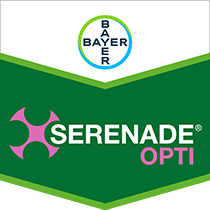Serenade Opti a key resistance management tool in Victorian strawberries
About
-
Category
- Grower Stories
- Video
-
Date
05 March, 2020
-
Location
Cora Lynn, VIC
-

About
Category
- Grower Stories
- Video
Date
05 March, 2020
Location
Cora Lynn, VIC
See how Fresh Crop Strawberries manage botrytis in a high rainfall area, and make picking easier with no withholding period, when using Serenade Opti.
Supplying strawberries to a major supermarket means Fresh Crop has to meet strict quality specifications, however the need for high quality produce is important across industry, whoever the buyer is.
This is according to Fresh Crop Director Michael Corrone, who has been growing strawberries at Cora Lynn (Victoria) for the last ten years.
Initially starting with 200,000 plants, Michael is now growing roughly 3-million plants over nearly 160 acres of land, supplying Coles with 100 per cent of his produce.

Image: Michael Gangi & Michael Corone
EE Muir and Sons agronomist Michael Gangi looks after clients’ strawberry, rubus berry and blueberry crops across Australia, and counts Fresh Crop among his clients.
He points out that the strawberry crop in Victoria has a nine-month season, flowering from September all the way through to May, exposing it to significant periods of warm, wet conditions which facilitate high disease pressure.
“We can get significant rainfall periods in November and December, making them our highest-pressure months for botrytis. The months from March through to May can also bring similar infection periods,” Michael explains.
The persistent disease pressure means the arrival of Serenade® Opti in the marketplace, a biofungicide which controls botrytis in grapevines and strawberries and suppresses bacterial spot in tomatoes, capsicums and chillies, was welcome.
“I worked in-field with Bayer prior to the product becoming commercial, doing a lot of the trial work in strawberries in the Yarra Valley, so I had confidence in it prior to its broader release - I knew what it was capable of and what chemistry it could be used to support,” Michael says.
As a biofungicide, Michael Corrone says Serenade Opti having no regulated residues (Maximum Residue Limit requirement) and no withholding period is very beneficial.
“Residues management is a big thing in our game, we've got to make sure we meet the requirements, so if we have a product like Serenade Opti which we can use in rotation with other chemistry as required, it’s good,” he explains.
“After spraying Serenade Opti, you can harvest the crop as soon as you please, which is good for us, although it is recommended to let the spray dry first.
“The weather we get here in Victoria, we can have four seasons in a day, but we can go out and spray with Serenade Opti so at least we can protect the crop a little bit.”

Image: Michael Corone
Serenade Opti has now become a key tool for controlling botrytis at Fresh Crop, fitting in well with the rest of the chemical rotation.
“We use Serenade Opti to break up the other botryticides we've got, so Michael (Gangi) might include Serenade Opti in the rotation in the middle of the season when we're harvesting,” Michael Corrone says.
“At the end of the day, the more chemical choices we've got, the more we can alternate the synthetic chemistry, so Serenade Opti will continue to be part of the rotation.”
Michael Gangi agrees that as protectant chemistry, Serenade Opti has a strong fit in resistance management, being able to take over from multi-site chemistry during the season.
He also believes Serenade Opti has a good fit to rest curative botryticides, particularly in drier summer periods when industry can get complacent with spraying. Overhead irrigation and summer rain events can still cause disease pressure and infection periods.
“Strawberries are usually one of the last crops to go onto chemical labels, so we're limited with what we have,” Michael Gangi says.
“So, any new mode of action that comes into our market is fantastic, particularly being biological, I think a lot of companies are going down that line now.
“The strawberry industry has taken up IPM strategies with pest management. This is almost the next stage with disease management, integrating biological products to rest the synthetics.”
Being the first biological botryticide registered in strawberries, Michael Gangi says now industry understands the impact Serenade Opti can have, the coming season will see an even larger uptake of the product.
“Even though we go through periods where botrytis infection pressure is low, fungicides are always being applied. This biological program has held up against a conventional program without Serenade Opti in it, so we know it works,” he says.
“With my clients there will definitely be a larger uptake this year with the product, not just in the Yarra Valley but also in Queensland, Tasmania and the other growing regions. It should now be a staple inclusion within strawberry programs.”
Serenade® is a Registered Trademark of the Bayer Group.




